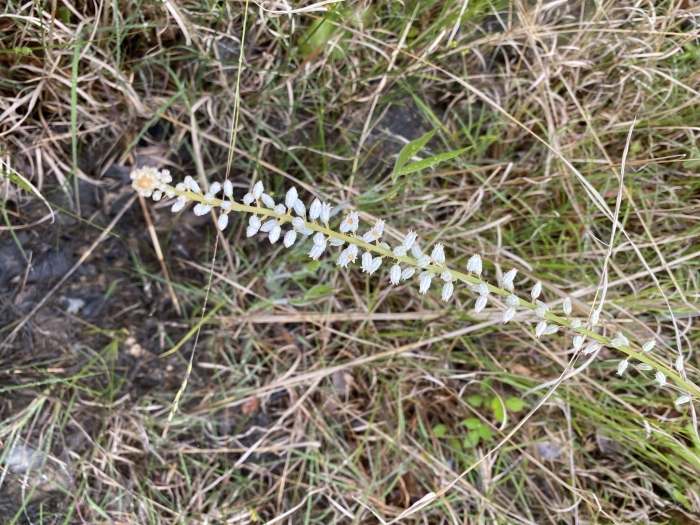Unicorn Root
(Aletris farinosa)
Unicorn Root (Aletris farinosa)
/
/

Carol Ann McCormick
CC BY 4.0
Image By:
Carol Ann McCormick
Recorded By:
Copyright:
CC BY 4.0
Copyright Notice:
Photo by: Carol Ann McCormick | License Type: CC BY 4.0 | License URL: http://creativecommons.org/licenses/by/4.0/ | Rights Holder: Carol Ann McCormick | Publisher: iNaturalist | Date Created: 2023-05-29T18:14:25Z |
























Estimated Native Range
Summary
Aletris farinosa, commonly known as unicorn root, white colic-root, or white stargrass, is a perennial herb native to moist meadows, prairies, and open woodlands of the eastern United States, extending into parts of Ontario, Canada. It typically grows in acidic, peaty, sandy, or gravelly soils that are well-drained but consistently moist. This plant forms basal rosettes of narrow, lanceolate, bright yellowish-green leaves that can reach up to 8 inches in length. From these rosettes, flowering stalks emerge, reaching up to 39 inches tall, and bear numerous small, tubular, white flowers that bloom from late spring to early summer. The flowers are somewhat showy due to their dense arrangement along the stalks. The fruit is a dry capsule that tapers at the tip.
Unicorn root is appreciated for its unique flowering stalks and is used in native plant gardens, wildflower meadows, and as a component in restoration projects. It is relatively low maintenance, requiring minimal care once established in the right conditions. In cultivation, it prefers full sun to part shade and requires soil that mimics its native habitat in terms of moisture and acidity. While not commonly found in the horticultural trade, it can be propagated by seed or division of rhizomes. Potential problems include root rot if grown in poorly drained soils. It is not known to be invasive when grown outside its native range, but care should be taken to ensure it does not outcompete other native species in restoration settings.CC BY-SA 4.0
Unicorn root is appreciated for its unique flowering stalks and is used in native plant gardens, wildflower meadows, and as a component in restoration projects. It is relatively low maintenance, requiring minimal care once established in the right conditions. In cultivation, it prefers full sun to part shade and requires soil that mimics its native habitat in terms of moisture and acidity. While not commonly found in the horticultural trade, it can be propagated by seed or division of rhizomes. Potential problems include root rot if grown in poorly drained soils. It is not known to be invasive when grown outside its native range, but care should be taken to ensure it does not outcompete other native species in restoration settings.CC BY-SA 4.0
Plant Description
- Plant Type: Herb
- Height: 1.5-3 feet
- Width: 0.2-0.5 feet
- Growth Rate: Slow
- Flower Color: White
- Flowering Season: Spring, Summer
- Leaf Retention: Deciduous
Growth Requirements
- Sun: Full Sun, Part Shade
- Water: Low, Medium
- Drainage: Fast, Medium
Common Uses
Bee Garden, Border Plant, Low Maintenance
Natural Habitat
Moist meadows, prairies, and open woodlands in acidic, peaty, sandy, or gravelly soils
Other Names
Common Names: White Colicroot, Unicorn Root, Colicroot, Crow-Corn, Mealy Star-Grass, Mealy Starwort, Star Grass, White Star-Grass
Scientific Names: , Aletris farinosa, Aletris alba, Aletris lucida,
GBIF Accepted Name: